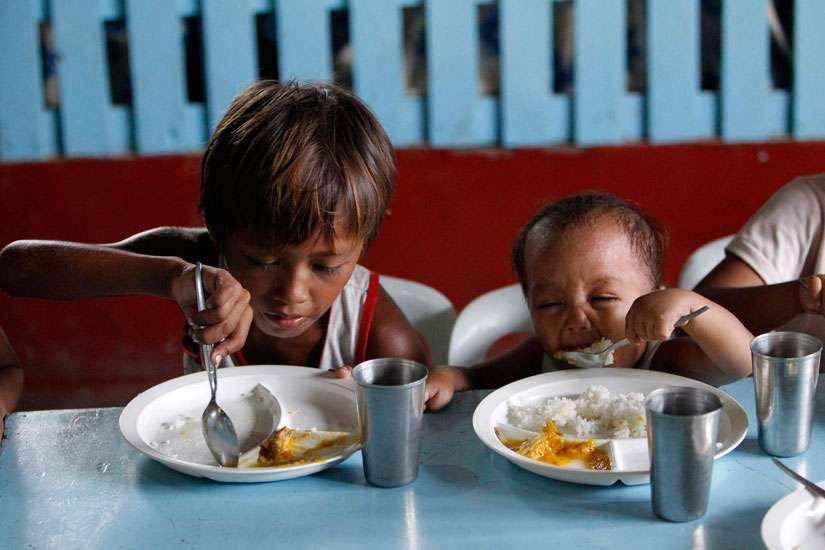In North St. Louis, Sylvester Brown Jr. starts quite literally from the ground up, tackling the problems of poverty in poor neighbourhoods, teaching kids to grow sweet potatoes on vacant plots of land.
Martina Liebsch, director of policy and advocacy for Caritas, the Vatican-based confederation of national Catholic relief, development and social service agencies, and Brown, founder of the Sweet Potato Project, described their organizations' approaches to poverty and hunger Feb. 8 during the annual Catholic Social Ministry Gathering.
The "One Human Family, Food for All" campaign launched late in 2013 combines prayer, advocacy, hands-on programs, education and even simply sharing food with neighbors in what Liebsch described as a similarly multi-layered problem.
One in nine people worldwide go hungry daily, Liebsch said, with the most affected populations living in sub-Saharan Africa, South Asia and East Asia.
"But we're seeing more and more hunger in rich countries," she added. For example, in Italy, where the German native lives, Liebsch said an estimated 10 percent of the population suffers from poverty and hunger. Meanwhile, the "scandal of food loss and waste" in industrialized countries amounts to 286 million tons of cereal products alone being thrown away annually -- the equivalent of 763 billion boxes of pasta, she said. Waste comes all along the system, Liebsch said, including during production, harvest and consumption.
The Catholic Social Ministry Gathering, Feb. 7-10 this year, combines education, training and advocacy on Capitol Hill on various social ministry and justice topics. This year more than 550 people, including more than a dozen from other countries, were registered.
Liebsch said part of the "Food for All" campaign is to broaden understanding that "to have food is a human right." The International Convention on Economic, Social and Cultural Rights, adopted by the U.N. General Assembly in 1966, references that, along with rights to work, an adequate standard of living, health care, education, family life and participation in cultural life. The United States signed the covenant in 1979 but it was never ratified by Congress.
She acknowledged the complexities of trying to correct the imbalances of having adequate production of food worldwide to meet everyone's needs, and listed a multitude of barriers to ensuring food is adequately distributed.
Among the barriers she noted: access to water, access to land, inadequate infrastructure, climate change, price speculation, trade policies, the monetization of food commodities, dysfunctional governments and violent conflicts.
On a smaller scale, Brown's St. Louis organization faces similar issues, but the Sweet Potato Project aims at tackling them at the neighbourhood level.
Besides showing young people how to grow and harvest sweet potatoes, the project teaches marketing, sales and self-sustainability. Beginning with a 10-week summer program, participants take their potatoes and convert them into a marketable product, sold in the community. They work with local chefs and St. Louis University to develop recipes and make a product -- currently cookies -- which are then sold directly and with internet advertising and sales.
Eventually, Brown said, he could see the model for the project going beyond St. Louis and helping communities around the world become more self-sustaining.
But Brown raised some eyebrows when he talked about his philosophy of using such programs not only to lift up poor African-American communities, but as a part of seeking to redevelop closed race-based communities.
"There once was a time when African-Americans had no choice but to live entirely among themselves," he observed, reliant upon each other for everyday functions from shopping to health care and policing. Decades of well-intentioned efforts at multicultural integration have resulted in a reduced sense of community ties and obligations, he said.
To reduce crime, poverty, even obesity caused by inadequate dietary choices, Brown said, power should be given to communities to control their own destinies.
The goals of the civil rights movement, enunciated by the Rev. Martin Luther King Jr. in his "I Have a Dream" speech of a society where black and white are equal and race, color and creed are not used to divide, have not resulted in income equality and the elimination of poverty, Brown said.
Along the way, "African-Americans have had their culture destroyed," he said, saying he thinks the next step toward empowering minorities is to "go back, don't be afraid to go back, to help create strong black communities." Such communities could develop alternative education, criminal justice and economic systems, he said.
He pointed to the traditional communities of immigrants that supported newcomers and provided cultural and economic support to boost younger generations into successful lives. Jewish, Korean and Arabic communities still often live in such environments, he said, which helps them remain strong in languages and cultures.


